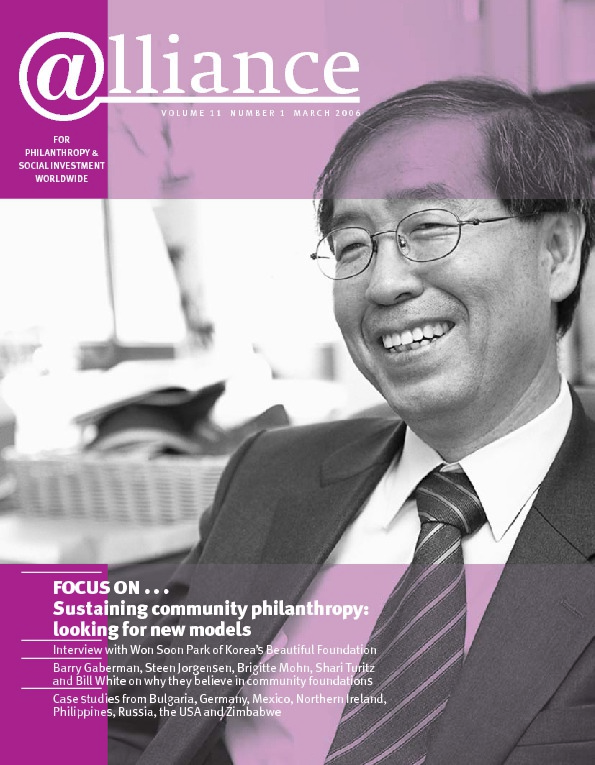In January 2002, Counterpart International, financed by USAID, launched the Bulgarian Community Fund and Social Enterprise Programme, led by Monika Pisankaneva. The aim was to revive traditional forms of philanthropy, which had almost disappeared under socialism, and to support the sustainable development of Bulgaria’s non-profit sector. The means chosen for doing this was to establish a number of community foundations throughout the country.
After a feasibility study involving consultation with private, non-profit and public sectors, three towns – Chepelare, Blagoevgrad and Gabrovo – were chosen for pilot projects. The early success of these three pilots meant that the model quickly spread to other regions of the country. There are now ten working community foundations in Bulgaria.
Ideas about what projects were needed came out of Local Initiative Groups, which attracted key figures from the three different sectors. Problem areas were identified and new projects devised. This unique model provided the opportunity for small and medium donors to have a say in the future of their communities and to give back to them in a way that was both appropriate and appealing.
The business approach: Pazardjik Community Foundation
Some of the newly established community foundations adopted a social enterprise model to help cover their operating costs. One good example is the ‘Community Fund – Pazardjik’, founded in December 2003 with the support of Counterpart, with the objectives of building civil society in the region; supporting local and regional projects in the spheres of health, education, science, culture, ecology, etc; and, last but not least, reviving the local tradition of philanthropy.
In addition to raising funds from private individuals, companies and the municipality, the new community fund earns income through managing a ‘video wall’. The wall is used in various ways – for paid advertisements, for announcements of local importance, and for entertainment in the summer months. With this income, they have successfully completed projects such as renovating local children’s playgrounds, running an anti-drug campaign, and restoring one of the town’s cultural symbols, the old park fountain.
The community fund has succeeded despite being planted in unpromising soil. Pazardjik is a municipality with many social and economic problems. The official unemployment rate is 15 per cent and the 300,000 population is declining as people leave the area. Nevertheless, the fund succeeded in winning trust and bringing together local business, NGOs and municipal authorities to work on developing the community.
Another organization whose prospects for self-sustainability are encouraging is the Chepelare Foundation, which is trying to build a Multifunctional Sports Ground with the participation of the municipality and local business. The municipality has given them free use of the land for ten years, during which time the foundation will lease the playground to visiting sports teams to earn income for the project.
Challenges
There are many other steps that Community Fund Programme Manager Monika Pisankaneva would like to see taken. One of these is the creation of a more favourable fiscal environment. ‘I would like to see better government policy stimulating corporate donations and philanthropy,’ she says. At the moment, the government encourages donors to give to government funds rather than to public or private foundations. While the first group can claim 50 per cent of net taxable income, the second group can claim only 10 per cent. ‘In other countries,’ she argues, ‘1 per cent or 2 per cent of income tax can be donated to a registered public foundation – this is known as percentage philanthropy. The same policy could be adopted in our country as well.’
She realizes that achieving a sustainable model community foundation will not be an easy task, and stresses that new forms of social investment and philanthropic models will be key to success. ‘We also need to build awareness and educate people about the importance of citizenship participation and involvement, and about strategic philanthropy (not just humanitarian philanthropy),’ she adds.
As part of this general effort, the ten working foundations in Bulgaria established their own association in June 2005, with Pisankaneva as Volunteer Executive Director. Its aim is to provide long-term assistance to its members after all international projects and programmes in the country have closed. The Association of Community Foundations in Bulgaria is planning its first conference on 28-29 April.
Desislava Angelova is a consultant with Allavida. She can be contacted at angelova@a-cable.net
For more information, see http://www.counterpart.org
For more information about the community foundations conference, contact Monika Pisankaneva at monika@counterpart-bg.org




Comments (0)